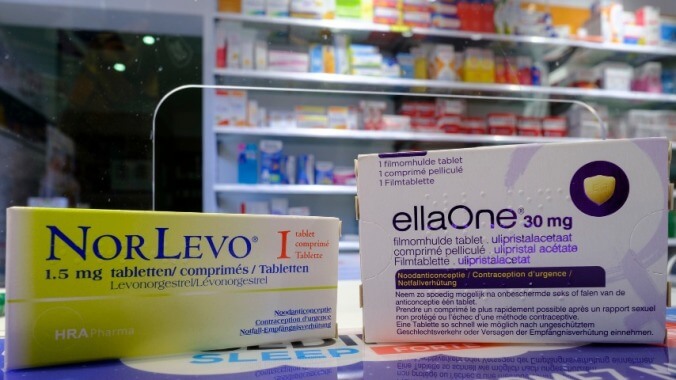As you might expect, anti-abortion groups were practically giddy about the news. Students for Life told The New York Times in response: “The pro-life movement should be vindicated. We’ve been arguing for years that Ella acts as an abortifacient.” The American Association of Pro-Life Obstetricians and Gynecologists gave a similarly misleading comment to The Atlantic: “Abortion advocates have long denied Ella’s potential to end an embryo’s life, but this study contradicts that narrative.”
Anti-Abortion Activists Are Hijacking a New Study to Go After Birth Control
"It’s been frustrating to see this has been reduced to a talking point against emergency contraception," Reproaction told Jezebel of new research that suggests the active ingredient of a prescription-only emergency contraception can help end a pregnancy.
Photo: Getty Images AbortionPolitics
Among Project 2025’s 900 pages, a significant amount of ink is dedicated to abortion pills. The document describes the medication as “the single greatest threat to unborn children in a post-Roe world,” and targets one particular brand of prescription-only emergency contraception, EllaOne. Project 2025 claims Ella should be excluded from the Affordable Care Act’s contraceptive coverage mandate because it’s an “abortifacient.” Unfortunately, this is part of a broader effort among anti-abortion activists to conflate emergency contraception (which prevents a pregnancy) from medication abortion (which ends a pregnancy).
Now, new reporting by journalist (and Jezebel contributor) Susan Rinkunas in The New Republic breaks down a recent study that, overall, should be good news for abortion access, but instead may arm anti-abortion activists in their crusade against both abortion and contraception.
The study found that the active ingredient in Ella, ulipristal acetate, can be used in place of mifepristone, which could be helpful if the mifepristone winds up banned in certain states. (Medication abortion typically involves a patient taking mifepristone to block progesterone, then misoprostol to induce a miscarriage.) For the study, 133 women up to nine weeks pregnant took 60 milligrams of ulipristal, then 800 micrograms of misoprostol 24 hours later. Of those 133 women, 129 completed abortions—a 97% success rate comparable to that of mifepristone.
-

-

-

-

-

-

-

-

-

-

-

-

-

-

-

-

-

-

-

-

-

-

-

-

-

-

-

-

-

-

-

-

-

-

-

-

-

-

-

-








































